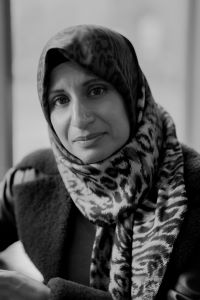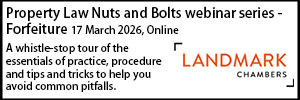- Details
“Good governance is for all of us to be involved in”
Lawyers in Local Government's new president, Aneeka Sarwar Muneer, speaks to Adam Carey about being the organisation's first Muslim president, her professional journey, and her plans to get junior lawyers involved in governance.
In April of this year Lawyers in Local Government (LLG) ushered in its next president – a Yorkshire-based principal litigation lawyer and deputy monitoring officer, who took on the presidency with a goal to champion diversity and good governance in the profession.
Last week, Aneeka Sarwar Muneer of Calderdale Council revealed her full platform at the LLG Spring Conference in her hometown of Leeds – a platform that she says, speaking to Local Government Lawyer, focuses on three main areas: "Grassroots engagement, governance for all, and inclusivity".
Her policy on grassroots engagement, Muneer explains, will focus on creating active regional groups with strong support from members and active networks.
These in turn will engage with local law societies and representative groups, such as the Society of Black Lawyers, alongside other Equality, Diversity and Inclusivity groups and the Bar, she adds.
Muneer, who has played an active role in LLG since 2011, is also serious about governance.
She says LLG should promote good governance and ethical standards in practice "to all in-house lawyers, as this is what sets us apart".
Her efforts in this area will be bolstered by an updated Code of Practice for Statutory Officers, which LLG is set to launch.
Finally, on inclusivity, Muneer wishes to support LLG members in breaking down barriers to create "role models at all levels within local government.
"We are going in the right direction but still have more to do," she says.
"Let's embrace the concept of 'authenticity' as a positive contribution to the workplace."
Speaking to Muneer – who has been a magistrates court advocate for local government for over 15 years – about her professional journey, it is easy to understand what informed her three policies.
Journey into law
Muneer, who describes growing up in a family where "you either do law or medicine," decided on her profession at quite a young age.
Her parents worked in local government and at 13 she took a work experience role at her local council.
She remembers being in awe of the city hall during her placement and notes that her time there was what first drew her toward working for an in-house legal service – but a healthy urge to prove others wrong also factored in to her career choice.
 "I remember I had a careers advisor at school who suggested I do nursing," she says.
"I remember I had a careers advisor at school who suggested I do nursing," she says.
"I was a bit defiant at that age, and I said, 'Well, actually, my parents want me to do law'.
"So she said, 'But that's really hard to get into. I wouldn't recommend that'.
"She kept trying to put me off, but the more she tried, the more I thought, 'Well, no, actually, I'm going to do law'.
"I remember walking out of that room thinking I'm going to do law, and I'm going to show her."
And it is fair to say that she did. Muneer went on to graduate from Leeds Metropolitan University with a bachelor's degree in law before moving to London to take her Legal Practice Course (LPC) at the Inns of Court Schools of Law, now known as City Law School.
From there, Muneer planned on stepping back from the legal world and considered working abroad instead of pursuing qualification – but the death of her grandmother led to a change in plans.
Her grandparents saw pursuing a legal career as prestigious, as it followed in the footsteps of Pakistan's first Prime Minister, Liaquat Ali Khan, who studied law in the United Kingdom and was called to the bar at the Inner Temple.
"When my grandmother passed away during my LPC year, that's when I decided I needed to qualify, and I became even more determined at that point."
After graduating, Muneer went on to do some paralegal work in private practice at Irwin Mitchell and a few criminal defence firms, but these placements "cemented" her interest in local government, she says.
In 2007, she moved back to Yorkshire to take her first "proper" job as a legal assistant at Bradford Metropolitan District Council, a local authority where she continued to work for the next 17 years.
She quickly landed a training contract at Bradford and rose to a senior solicitor role within three years.
Bradford offered a lot of learning opportunities given its size, she says. It also offered a multicultural working environment, allowing her to feel at home.
Describing her time there, she says: "I never felt that I needed to explain myself, that I needed to explain Ramadan, explain fasting, or explain who I was or what I did.
“In Bradford, I never had to do that – and I look back and I realise actually what that gives an employee to feel so comfortable.
"So I loved Bradford, and I always felt that I was developing there."
Juggling roles
Towards the end of her tenure, Muneer worked part-time at Bradford and, on her off days, began working as a locum senior solicitor in prosecutions and regulatory law at Newcastle-Under-Lyme Borough Council.
"That was remote working, doing exactly the same job," she says, describing her locum role.
"I found it quite enjoyable doing the same work but for a different authority because you're learning so much more in a different way."
She then left Bradford in June 2022 and took on another locum position at Calderdale Council, leading her to be simultaneously working as a locum for Newcastle and Calderdale.
Describing the juggling act, Muneer says: "You have to be really, really tight with time management because there would be some days where I would need to progress cases for, say, Newcastle but also progress cases for Calderdale.
"Luckily, both authorities were very supportive of that, and I just then took my workload as being as though I was working for one authority - it was just prosecution work."
She notes that the work allowed her to meet new clients and learn more about how different authorities function.
However, she soon decided to leave the locum world and join Calderdale as a full-time prosecution solicitor.
From there, Muneer quickly rose into senior leadership, being promoted to principal solicitor and deputy monitoring officer in February 2023.
Taking the leap
Muneer says she always wanted to take the leap into the governance side of her council, but did not quite know how to make the move.
To help, she completed the Law Society's diploma in local government law and practice in 2018, which she says gave her "great insight" into what was possible in local government and pushed her towards the monitoring officer role.
Now, more than a year into the deputy monitoring role, Muneer says she is enjoying the new position but has one small gripe.
"The only thing I'll say about deputy monitoring officers is that you only get the responsibility until the MO is off," she notes.
"So then you step up to do the monitoring officer work, but at the same time, it's bit of a catch-22.
"You also feel a little bit nervous, thinking 'Well, actually, they're away on holiday, but I don't feel that I've had experience in this'.
"I think what's so important – and what I know that I do have at Calderdale – is that the chief executive is very supportive of me, and I have a really good relationship with the finance officer."
Having a great working relationship with the s151 officer and chief executive is a huge reassurance, she notes.
Supporting LLG
While Muneer was rising through the ranks of local government, she was also steadily increasing her responsibilities at LLG.
She has been actively involved in the organisation through much of her legal career, having taken her first leadership position in the organisation in 2011, leading the West Yorkshire group.
She later also became regional lead for prosecutions for LLG’s Yorkshire and Humberside group for several years, before becoming membership director in April 2020, a position that put her on the organisation's board.
Part of the reason why she pursued the continued roles within LLG was that she felt the North did not have the voice it needed within the organisation – and joining the board in 2020 came easily as it met remotely during the pandemic, Muneer says.
Once Muneer was on the board, she applied for Deputy Vice President in April 2022, which automatically put her on track to become Vice President and then president over the course of two years.
Breaking barriers
Muneer’s appointment makes her the organisation's first Muslim president, an admirable title that, surprisingly, she initially wished to downplay.
"I didn't go in thinking, 'Oh, yeah, I'm going to be the first Muslim president', and I actually never wanted it to be a thing because there's more to me than someone who wears a headscarf, and your religion shouldn't really define you," she notes.
But Muneer now sees it as an opportunity to promote the idea that "if you can see it, you can be it".
"I realised that it's something that has to be addressed, and I thought if it is something that I have to address, then it's also something that will naturally inspire others."
She hopes her presence at the top of the organisation will help pave the way "for others who feel that there may be barriers, whether they're visible or invisible, to progression.
"Whether it's someone from the LGBTQ community, or whether it's someone from the Sikh background, whatever you're facing, I think we need to get to a point where we'll no longer have the 'first', that it's just a natural thing that happens."
How junior lawyers can bolster governance
Muneer’s effort to inspire others is one of a number of ideas she wishes to promote while president.
She also want to build on the work to boost the position of LLG’s regions, building on the work to appointment a series of regional directors last year.
“I'd love to see the regional directors work on relations with the Law Society, the local Law Society, the local education institutions to look at ways to really support lawyers in the regions,” Muneer says.
Part of this work will involve regional directors working with universities and colleges to promote work experience placements.
Another main policy area involves a push to convey the notion that the whole legal department - junior lawyers and up - is responsible for good governance.
"One of the big things for me is for all lawyers in local government to realise that good governance is for all of us to be involved in, not just MOs, which is what sets us apart so much from other lawyers."
In practical terms, this means seeing junior lawyers having more of an understanding of the overall council decision-making "because we're not just about the law," Muneer says.
Governance could be improved with local government lawyers at the middle solicitor level imparting their knowledge on council structure, committees and how policy is passed to junior lawyers coming in, she believes.
She says integrity is an important factor in good governance too.
Muneer points towards the SRA's guidance in governance for in-house lawyers as a valuable document for understanding ethical standards and the pressures lawyers feel from the political side of their local authority.
"I think what can happen - and I've heard it from other lawyers - is that [...] you're compromised between what clients are wanting and actually what is ethically correct, what is proper," she says.
"At the end of the day, I think as a prosecution lawyer, I can always stand back and say, well, I'm an officer of the Court. That's it, and literally, I've said that to my clients."
It takes courage and strength for solicitors to carry out their jobs in these circumstances – and "that's what has to happen in order for good governance to actually work.”
These pressures are daunting but should also be cause for local government lawyers to celebrate themselves more, she says, "because I think we are a unique breed, I really think we are".
"I think what we did during lockdown, how committed we are to public service and how willing we are to take a cut on our own paycheck simply in order to serve is just something that we overlook as local government lawyers."
Adam Carey is a reporter at Local Government Lawyer.
Child Care Lawyer
Legal Director - Government and Public Sector
Locum roles
 Safeguarding Issues and Fairness in Investigations and Hearings - 3PB
Safeguarding Issues and Fairness in Investigations and Hearings - 3PB
24-02-2026 11:00 am
Online (live)
 Children and Young People (DoL, Competency and Capacity) - Peter Edwards Law Training
Children and Young People (DoL, Competency and Capacity) - Peter Edwards Law Training
25-02-2026
Online (live)
 One Project or Two? EIA Rules for Renewable Schemes and Grid Connections - Cornerstone Barristers
One Project or Two? EIA Rules for Renewable Schemes and Grid Connections - Cornerstone Barristers
26-02-2026
Online (live)
 Court of Protection Property and Financial Affairs Webinar Series: Contested Statutory Will Application - 39 Essex Chambers
Court of Protection Property and Financial Affairs Webinar Series: Contested Statutory Will Application - 39 Essex Chambers
02-03-2026
Online (live)
 Housing and Homelessness Conference - Birmingham 2026 - 4-5 Gray's Inn Square
Housing and Homelessness Conference - Birmingham 2026 - 4-5 Gray's Inn Square
03-03-2026 9:30 am
East Midlands
 Law Enforcement Data Processing and Part 3 of the DPA 2018 - Act Now
Law Enforcement Data Processing and Part 3 of the DPA 2018 - Act Now
05-03-2026 10:00 am
Online (live)
 Cross-Border Placements of Children - Justin Gray, Trinity Chambers
Cross-Border Placements of Children - Justin Gray, Trinity Chambers
05-03-2026 3:00 pm
Online (live)
 The Case for Ecocide Law: In Conversation with Gerard Forlin KC and Jojo Mehta - Cornerstone Barristers
The Case for Ecocide Law: In Conversation with Gerard Forlin KC and Jojo Mehta - Cornerstone Barristers
05-03-2026 5:00 pm
London
 Grappling with S73 - variations of conditions applications or appeals - Ivy Legal
Grappling with S73 - variations of conditions applications or appeals - Ivy Legal
09-03-2026
Online (live)























































































































 Planning Law Update Wales for Local Authorities and Other Government - FTB
Planning Law Update Wales for Local Authorities and Other Government - FTB  The Procurement Act - One Year On - DWF
The Procurement Act - One Year On - DWF  The ERA – An Overview - Sharpe Pritchard
The ERA – An Overview - Sharpe Pritchard  Certified Information Privacy Manager (CIPM) - The Training Centre
Certified Information Privacy Manager (CIPM) - The Training Centre  Roundtable Event: Risks arising from Inquests and Legal Update - Devonshires
Roundtable Event: Risks arising from Inquests and Legal Update - Devonshires  The General Data Protection Regulation - Act Now
The General Data Protection Regulation - Act Now  Data protection Conference - Hugh James
Data protection Conference - Hugh James 